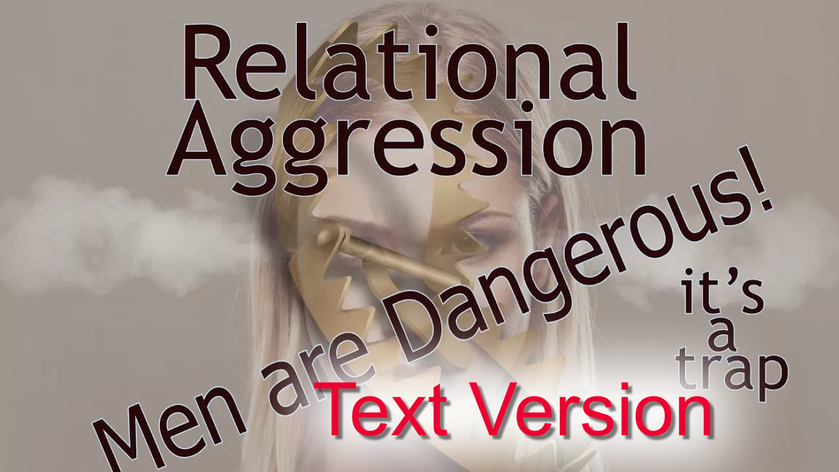This is the text version of an older video post on relational aggression. Many of you seemed to like the last text version of the 1 in 4 research video so I trhought I would post this one. I hope you find it useful. I will be posting the accompanying video soon.

A gynocentric world is a dangerous place for men. The hazards are many including traps that are simply beyond the awareness of most. Relational aggression is one of those traps. Most of us are aware of the physical violence of many women and the cultures disinterest in holding women accountable but this is different. Relational aggression is more insidious due to its invisibility and the encouragement from the culture at large. Let’s have a look at this trap called relational aggression.
We have spent nearly 50 years warning women about men’s physical aggression. We’ve created laws, built institutions and flooded the media in efforts to protect women. In the process we have been told repeatedly that this is not just a problem of a few men who are out of control but instead is a problem of all men and their masculinity. This is Crazy stuff.
All the while there has been a muffled silence about women’s aggression. Some has trickled through like a bit of attention on mean girls but the reality and lethality of women’s aggression has rarely leaked into the media. The sad news is that women’s aggression is really a trap for men. Being aware of the trap may help you navigate and steer clear.
With that background let's have a good look at women’s relational aggression, how it works, where it starts and the dangers and traps that men face as a result. We will also spend a little time in looking at how this form of aggression impacts nearly all men’s issues and importantly how feminism is literally based on this form of aggression but is never called out for it.

Let’s get started.
Relational aggression starts early. The youngest female researchers have identified practicing relational aggression was 2.5 years old. But what is this thing called relational aggression?
The best definition I have seen calls it “Bullying without physical violence.” That sums it up pretty well. Researchers define it something like this:
Behaviors that harm others through damage (or threat of damage) to relationships. They go on to talk about how relational aggression is meant to destroy feelings of acceptance, friendship, or group inclusion. Basically attacking someones identity and trying your best to hurt them without being violent.
How is this accomplished? Well through excluding, ignoring, teasing, gossiping, secrets, backstabbing, lies, false accusations, rumor spreading and hostile body language (i.e., eye-rolling and smirking).
These may sound more tame than physical aggression but think about it. How many suicides have you heard about that were due to someone getting beat up repeatedly? Maybe a few. But then think about how many suicides you have heard about from people being ostracized or shamed by groups? I have heard more of those and I am betting you have too.
So this stuff is lethal. It may sound harmless but that is simply not the case. It can lead

to very serious consequences including what is being called 3rd prty abuse which is when relational aggression tricks authorities into unwittingly continuing the abuse.
Relational aggression is also stealth. With physical aggression you leave bruises, scars, or broken bones. These things can be seen. People gasp when they see them. But how about relational aggression? You can’t see it. It Is basically invisible. If that wasn’t bad enough, the invisibility also makes it very difficult to challenge. Try proving someone gossiped and spread lies about you. Try disproving a false accusation. Both nearly impossible but both potentially lethal. This leaves relational violence a stealth tool that is so easy to deny. "Who me? I didn’t do anything, why are YOU so upset about nothing?" And of course gynocentrism plays its ugly part in all this in protecting the lying female making matters worse still.
This is not to say that there are no physically violent women. There are. The research has found some interesting things about violent women. It seems that those women who are physically aggressive and men who are relationally aggressive have been found to have more psychological pathological than their counterparts. So be on the lookout for relationally aggressive men and physically aggressive women. Danger Will Robinson. Danger!
Some are seeing that one precursor for relational aggression is what they are calllng “hostility attribution bias.” Basically this means that the person assumes wrongly that a hostile act has occurred and wrongly assume it was directed towards them. Say a young girl sees two friends whispering and wrongly assumes it is about her. She is a experiencing hostility attribution bias and this apparently occurs more with girls and women in relationships.
How many times as a man have I heard something from a woman claiming that I thought a certain way or did something for a certain reason. I know it is completely false but she is beyond convinced that she is right and I am lying. This ever happened to you? I bet it has, repeatedly. The researchers are saying that sometimes it is this hostility attribution bias that stimulates the relational aggression. Makes sense to me and it gives us a clue about how to defend ourselves. Beware of the hostility attribution bias. This is a red hot danger sign. Run if you can.
One researcher, Nicki Crick, studied young boys and girls and found some very interesting results. She noted that 15.6% of the young boys used physical aggression but only .4% of the girls. She also found that 17.4% of the girls used relational aggression and only 2% of the boys. Crick totaled these and realized that the boys and girls were equally aggressive, they just had different paths to get there. The boys were more physical, the girls more relational. More and more of recent research is working to measure both relational aggression and physical aggression but you still don’t hear much about that in the media.
One might assume that if boys and girls have similar levels of aggression that you would find that the culture would address both. Right? Wrong. Our gynocentric culture perseverates on the aggression if males and ignores and even promotes the relational aggression. Men’s violence is seen as atrocious and wicked and women’s relational aggression is ignored.
One indicator of this bias was shown by researchers when they studied the animated films of Disney. What did they find? They found that 100% of the animated Disney films contained relational aggression and specifically found that the average was 11 relationally aggressive acts per hour. That’s an act every 6 minutes or so. The relational aggression was often portrayed as justified and shown to have few negative consequences. The worst news is that such aggression was often portrayed by female characters who were attractive, rich, and popular.

The media is literally training our young girls that it is okay to be relationally aggressive, in fact it is what rich, attractive, and popular girls do. There are no calls of concern from parents or teachers to stop this. I hope you are getting a picture of how dangerous this is for men and boys.
The trend for girls to be more relationally aggressive than boys continues into adolescence and beyond. There is some evidence that men start using more relational aggression as they get older but I think the accepted idea is that women are more likely to use relational aggression. It does make one wonder why.
Why Relational Aggression?
The evolutionary psychologists have some ideas about that. They say that men for eons have had to aggressively compete with other men in order to seek reproductive access, in other words, get the girl. In doing this they would form hierarchies not unlike other primate males who physically compete for alpha status. The higher your status in the hierarchy the more likely you get the top female. Men became accustomed to competing with their fellows and taking their place within a hierarchy of winners and losers and all those in between. Women on the other hand didn’t have the same need to aggressively compete for a mate. She was a chooser not a competer. Instead women needed a community to aid her while she was dependent due to being pregnant and raising children. This pushed women to not compete, but to strive to be an accepted part of the group. If a woman tried to elevate herself above the others in her group she was seen as an outlier, someone who was betraying the group by trying to make themselves appear above the others and this was discouraged or even punished. So the idea was to only be aggressive if it was stealth and could be easily denied. This insured their place in the group.
Present day psychologists see this tendency in the workforce where if a woman appears to be succeeding and doing better than the other women at the office she is often subject to relationally aggressive attacks by the other females. Gossip, finger pointing, rumours, lies etc. This hides their aggressiveness since open aggression would be seen as counter to the group cohesiveness. Making the attacks quiet keeps the group stable. She doesn’t sacrifice her group inclusion.
Researchers have found that Women’s in-group preference, that is an automatic preference for their own gender is over four times as important as a male’s in-group preference is for him. Women depend on other women and are reluctant to risk exclusion.
Another example of women being dependent upon the group is the recent understanding of how women heal from loss and stress. Shelly Taylor’s research found that women, when stressed, move towards interaction and other people. Women depend on others, mostly other women, to aid in their healing unlike men who tend to heal through action, or inaction on their own. This makes a women’s group of friends important to her for her own healing and offers us more reasons why she would not want to appear overtly aggressive and risk being excluded.
This actually explains something I saw in a research study years ago. The study had men and women playing a computer war game. The subjects were to decide how much to bomb the opponents. Under most conditions the women bombed far less than the men, but in one condition they bombed as much or more than the men. That was when others could not see how much the women were bombing! As long as no one could see, it was bombs away! The researchers were puzzled but Again, this seems to show the female preference for relational aggression that can be hidden and easily denied.

Men's Issues
So how does relational aggression play out in men’s issues? Simple. It is embedded in just about all of it. Think about divorce and parental alienation. What an alienating mother does to the child is all relational aggression. She is telling lies to the child about the father, she is attempting to use those lies to hurt the father. This is relational aggression. And it is obviously lethal.
Think about false accusations. Falsely accusing a man of rape is straight up relational aggression. It is lying with the intent to cause pain.
Both cases, the Parental Alienation and the false accusation show us something important. The lies that are used are very difficult to disprove and are very easily denied. If the father or the falsely accused man challenges the woman it is simple for her to deny and blow it off. If it ever gets to the point of her needing to admit she did this she can then say, “I didn’t mean to hurt anyone.” It is nearly impossible to disprove a false accusation. And keep in mind in both of these instances it is likely the authorities will get involved and become a tag team with 3rd party abuse.
Think of domestic violence. The feminists have maintained for decades that domestic violence is all about violent men beating innocent women. But is that really the truth? There are likely a small minority of couples where the husband is a sociopath and the feminist version is close to being correct but I think those situations are very rare. Research has shown us that most domestic violence is reciprocal. That is, both parties are involved in the altercations. So how did they get to the point where the man would hit her? It doesn’t take much creativity to realize that she likely used relational aggression of some sort that lit his fuse and eventually moved into their violent interchange. It’s a very good guess that she is using her relational aggression skills to create as much pain in him as she can and then he blows his top and the feminist oligarchy comes in and ignores her part in igniting the fuse and only focuses on his overt violence. Then the entire 3rd party abuse Duluth treatment regime takes over and officially sees him as the problem and her as the victim. That is insane.
It wasn’t always like that. When I worked at a mental health center in the 1970’s we were trying to help female victims of DV. At that time the feminists did not have a stranglehold over the services like they do now. There were competing voices. One of those competing voices was those doing family therapy. They believed that in the majority of cases (excluding the sociopaths) that what was needed was to help the couple with conflict resolution. This of course really pissed off the feminists since it negated their idea of bad man victim woman. A huge fight ensued between the two groups and as you can imagine the feminists won. Who knows what sorts of relational aggression they used to get their way. They needed to be sure that their basic assumption of men bad women victim was not tarnished or given a secondary place. Thus the feminists submarined any kind of attention that might have been paid to the woman’s side of the problem. Only men were the bad guys.
Feminism is Relational Aggression, They are the mean girls.
Where did that come from? Think back to the hostility attribution bias. Remember that? When you wrongly assume intent? The whole of feminism has a massive hostility attribution bias in their assumptions that men are the root of their problem. They blame men. Individuals misinterpret single interactions while groups like feminism misinterpret huge swaths of reality. The feminists have misinterpreted men’s providing and protecting of women for ages as being the oppression of women. That’s hostility attribution bias on steroids. Somehow they have convinced nearly everyone that this falsehood is the truth. Of course it is not and it is merely a mistaken assumption but in this case it is a deadly one.

Feminists start by swallowing a huge hostility attribution bias but they go much farther. In so many ways feminists act like mean girls. Don’t disagree with a mean girl, if you do you will pay a huge price. Same thing with feminism. Try disagreeing with a feminist and see what happens. Mean girls. Feminists bully by relational aggression. They have been telling lies and spreading rumors about men for decades and everyone assumes they are being honest. That’s Relational aggression. They threaten their own members with exclusion if they don’t follow the exact party line much like the mean girls do. They bully. They use the same exclusionary threats with legislators when they demand their bills are passed or else they will exclude them and label them as misogynists. Our cowardly legislators have been unable to rise above the bullying and the open blackmailing and this has left us with laws that are written by bullies with a huge bias.
Mean girls know they lie, and so do feminists. But they also lie about lying. Take false accusations as an example. The false accusation itself is purely relational aggression. It is a lie told that is meant to hurt. But the mean girl feminists add on to that. They lie that women never lie. This entire idea of forcing everyone to always believe the woman no matter what, is actually a relational aggression since it is simply a lie on top of another lie. I mean really. Could these people really believe that women never lie? They don’t, but they are willing to lie in order to get their way, just like the mean girls.
In the end it is all about power and control. The two very things they accuse domestic violence abusers of doing. Mean girls demand power and control and so do feminists. I think it is time we started to call feminists mean girls, and point out their relational aggressiveness every time we see it.
We need to do the same thing with the women in our lives whether it is our spouses, sisters, mothers or whoever. We need to keep our eyes peeled for hostile attribution bias and for relational aggression and call them out when we see them. Most importantly we need to maintain our cool and calmness as we confront. Speak the truth and don’t back down. Remember the relational violence is intended to get you upset and pissed off. Don’t let it. Your upset WILL be used against you. Calmness will help you turn the tables. If you disallow them to piss you off it will likely backfire and instead they will be the ones to blow.
So guys I hope you are seeing that relational aggression leaves men in a very vulnerable state. Women are literally encouraged to practice this stuff at your expense and the expense of your children. Use caution and keep in mind that men are good, as are you.


















